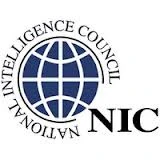Overview[]

The National Intelligence Council (NIC), a congressionally-mandated council, is the Intelligence Community's (IC) center for midterm and long-term strategic thinking. It is composed of some 18 senior analysts and national security policy experts and provides the U.S. intelligence community’s best judgments on crucial international issues. NIC members are appointed by the Director of National Intelligence and routinely support his office and the National Security Council.
The National Security Act, as amended, provides that the DNI appoints the members of the NIC and they serve at his pleasure. None of the NIC appointments require the advice and consent of the Senate.
The responsibilities of the NIC are further set forth in Intelligence Community Directive Number 207, National Intelligence Council.[1] Directive 207 requires that the NIOs, acknowledged experts in their areas of responsibility, provide intelligence assessments to the National Security Council, military decision-makers, and Congress. To accomplish this, NIOs may task agencies to provide analytical support. They may also work with officials in the ODNI to establish requirements for collection efforts by the various agencies (changing collection efforts can involve the major realignments of technical systems such as satellites).
The NIC's primary functions are to:
- Support the Director of National Intelligence (DNI) in his role as head of the Intelligence Community.
- Provide a focal point for policymakers to task the Intelligence Community to answer their questions.
- Reach out to non-government experts in academia and the private sector to broaden the Intelligence Community's perspective.
- Contribute to the Intelligence Community's effort to allocate its resources in response to policymakers' changing needs.
- Lead the Intelligence Community's effort to produce National Intelligence Estimates (NIEs) and other NIC products.
The NIC's goal is to provide policymakers with the best, unvarnished, and unbiased information — regardless of whether analytic judgments conform to U.S. policy.
The work of the NIC ranges from brief analyses of current issues to "over the horizon" estimates of broader trends at work in the world. Although most of its work is for internal government use, it also produces or commissions unclassified reports, many of which are available on its website.
References[]
See also[]
- CD 207 - National Intelligence Council.